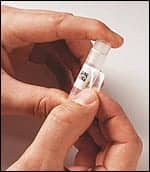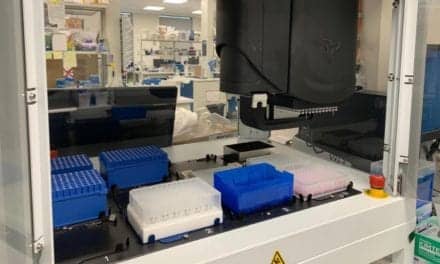DioGenix Inc, Gaithersburg, Md, has formed an alliance with Fast Forward, a subsidiary of the National Multiple Sclerosis Society, to develop a novel blood test for multiple sclerosis (MS).
Fast Forward will provide up to $500,000 as part of a Sponsored Research Agreement that will enable DioGenix to expand an ongoing clinical trial of its MS diagnostic, MS Precise™, a proprietary next-generation sequencing assay that measures changes to the adaptive immune system by analyzing B cells isolated from cerebral spinal fluid (CSF). This funding will allow DioGenix to determine if the same approach will work in blood samples.
The ability to now accurately identify early disease events affecting the adaptive immune system with next-generation sequencing provides an opportunity for an earlier diagnosis of MS and differentiation of disease subtypes. Validation of a DNA blood signature for MS is an important next step in DioGenix’ plan to develop a neuroimmune panel that would distinguish other immune-mediated neurological diseases that share certain biological features with MS.
“Even with improving imaging capabilities, we are still challenged to more specifically correlate MRI findings and symptoms to actual disease biology,” says Larry Steinman, MD, professor of neurology at Stanford University School of Medicine and a well-known innovator in neurological research. “B cells are integral to early disease mechanisms in MS and other neurological diseases. Technologies to elucidate immunoglobulin DNA rearrangement in the B cell genome involved in specific immune-mediated neurological diseases will be critical for understanding and treating patients.”
MS Precise uses next-generation sequencing to measure DNA mutations found in rearranged immunoglobin genes in B cells isolated from CSF. These mutations are a result of the adaptive immune system’s response to a perceived challenge to the patient. The changes in the B cell DNA correspond to the production of diverse antibody libraries aimed at fighting the perceived foreign invader. It is believed that the specific mutational changes observed in patients with MS are different from those observed in patients with similar neurological diseases because the antigens recognized by the antibodies are different. MS Precise would augment clinicians’ current standard of care for diagnosis of MS, providing measurement of changes in B cell DNA as compared to the currently available test that merely measures the presence of immunoglobin G proteins in the CSF.
According to the National Multiple Sclerosis Society, at least 400,000 Americans have MS, and every hour someone is newly diagnosed.
[Source: DioGenix]




